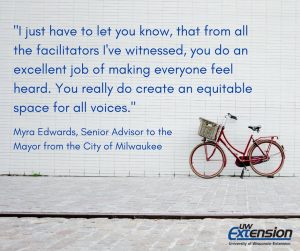
What is the role of UW Extension in the Community? What do Extension Educators actually do? We are exploring these ideas in our Extension At Work series. This article focuses on the work Family Living Educator Lilliann Paine has been doing to create a coalition with the Urban Economic Development Association and other community members that will build equity and financial capability in our communities.
In the Milwaukee County Office, we use value cards to request testimonials about how our Educators are affecting program participants. Myra Edwards, Senior Advisor to the Mayor of the City of Milwaukee, shared one of the impact cards from the coalition Family Living Educator Lilliann Paine created (Financial Equity Group (FEG)) about her facilitation style:
“I just have to let you know, that from all the facilitators I’ve witnessed, you do an excellent job of making everyone feel heard. You really do create equitable spaces for all voices.“
This month’s article is written by Lilliann about her work and how she builds equitable spaces.
The Financial Equity Group
by Family Living Educator Lilliann Paine
For a collaborative to be sustainable over time, participants need to go through a facilitated process where common interests and key barriers are identified and discussed together. From March 2017 – December 2017, I was contracted by Urban Economic Development Association (UEDA) to plan and facilitate four to six meetings of community-based organizations, financial institutions and other partners to discuss forming a collaborative. As an Extension Educator, I wore many hats and I provided accountability.
As a co-facilitator, I was intentional about grounding the meeting space in concepts of equity. We made a concerted effort to challenge participants to think and accept new information. Racial equity work is also about changing systems and centering the experiences and voices of people and communities of color, thus we utilized The Color Brave Space format to establish rules of engagement developed by Equity Matters:
- Put Relationships First—we worked to build community and trust with an awareness of power dynamics specifically for the ideological stance that poverty is a mindset.
- Keep Focused on Our Common Goal—we strove to recognize systemic barriers and individual challenges, while creating connections to resources to overcome those barriers.
- Notice Power Dynamics in the Room—who talks a lot, who used their title and active listening
- Create Spaces for Multiple Truths and Norms—economic disparities are closely linked to racial disparities. In Milwaukee, this closely overlaps with communities of color and neighborhoods that are consistently under-resourced.
- Be Kind and Brave—there was a true commitment to work together to produce results, irrespective of funder commitments for collaboration
- Practice Examining Racially Biased Systems and Processes—reminder that individual actions are important, and systems are what are left after all the people in the room leave.
- Look for Learning—encouraging participants to have a growth mindset.
We originally called ourselves the “Financial Capability Collaborative” (FCC). Together, we experienced a process utilizing a World Café Format in the formative stages of development per my recommendation. The first meeting was held in June 2017 and utilized a world-café style to visualize the type of space we wanted to create together through three progressive rounds of conversation. Key themes that emerged through both the World Café meeting and the survey included:
- Financial capability/empowerment is not a linear process
- People have different lanes they can choose from to achieve their financial goals
- Our job is to make those lanes known and accessible
The principle aim of FCC was to operate within a collaborative structure that encourages innovation, and increases the impact of organizations providing financial capability services to individuals and families in the Greater Milwaukee area. Economic disparities are closely linked to racial disparities. In Milwaukee, this closely overlaps with communities of color and neighborhoods that are consistently under-resourced. Early on, participants of FCC articulated the desire to work with an awareness of policies that lead to negative racial impacts.
By October 2017, the group had reached consensus on the vision and purpose, and we collectively refined the statements. A ranking activity was developed to finalize goals, objectives and key work areas for 2018. As a subject knowledge expert, I put together vision, mission and values statements for the collaborative, and the “financial capability collaborative” became the Financial Equity Group (FEG).
FEG is positioned to leverage the relationships of several organizations working within the financial sector. While the Alliance for Economic Inclusion (AEI) works to expand economic opportunity for Milwaukee-area residents through transactions accounts, the FDIC sponsors the AEI and their scope is limited as a Federal regulator. Additionally, there are emerging efforts in Milwaukee that could gain traction and resources through a collaborative structure. For example, UEDA and Guaranty Bank has talked with Cities for Financial Empowerment about Milwaukee forming a Bank On coalition that would offer “safe accounts” to assist low- to moderate-income status individuals with accessing mainstream financial services. The City of Milwaukee has been working to develop a citywide Children’s Savings Account program.
We presented the FEG at the December 2017 Alliance for Economic Inclusion meeting, to gather input and new participants to move forward with the work in 2018.




